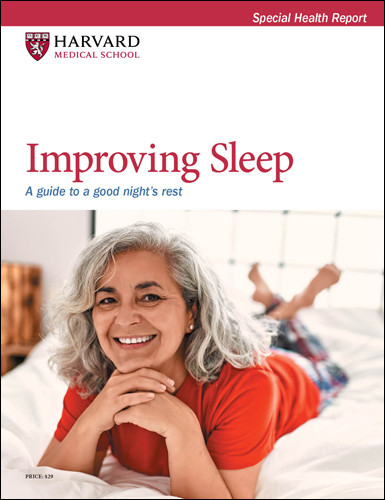Keep midday naps to less than 30 minutes
In the journals
- Reviewed by Howard E. LeWine, MD, Chief Medical Editor, Harvard Health Publishing; Editorial Advisory Board Member, Harvard Health Publishing

The health benefits of taking afternoon naps are well documented. They can improve mood, reduce fatigue, and increase alertness. But how long should they last? A study in the May 2023 issue of Obesity suggested the ideal duration is less than 30 minutes.
The observational study included 3,275 healthy adults. Baseline health measurements were taken, and participants completed a questionnaire on their napping habits and other lifestyle factors like diet and sleep. The results found that compared with people who did not nap, those who took midday naps lasting 30 minutes or longer had a higher body mass index and levels of cholesterol, blood sugar, and blood pressure. By contrast, those who had shorter naps (less than 30 minutes) did not share these risks and were even less likely to have elevated blood pressure than those who never napped.
According to the researchers, some of these risks may be the result of long naps disrupting daily circadian rhythms, which can lead to insulin resistance, obesity, and metabolic syndrome (a cluster of conditions that increase the risk of heart disease, stroke, and diabetes). Another possible connection could be overeating, as many people who napped for longer than 30 minutes reported feeling hungry and craving sweet foods afterward.
Does it matter how often you nap? All afternoon nappers, no matter how long they slept, averaged about four naps per week, but the researchers found no link between frequency and higher health risks. So, enjoy your afternoon naps, but keep them under 30 minutes, and don't nap too late in the afternoon, as it could interfere with your night's sleep.
Image: © Edwin Tan/Getty Images
About the Author

Matthew Solan, Executive Editor, Harvard Men's Health Watch
About the Reviewer

Howard E. LeWine, MD, Chief Medical Editor, Harvard Health Publishing; Editorial Advisory Board Member, Harvard Health Publishing
Disclaimer:
As a service to our readers, Harvard Health Publishing provides access to our library of archived content. Please note the date of last review or update on all articles.
No content on this site, regardless of date, should ever be used as a substitute for direct medical advice from your doctor or other qualified clinician.
















